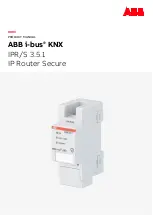
74K™ core features for debug and profiling
113
Programming the MIPS32® 74K™ Core Family, Revision 02.14
ing access to the transmit (core to probe) and receive FIFOs. These FIFOs are included to isolate the software visible
interface from the physical transfer of bits to the probe and allow some ‘burstiness’ of data. Associated with each 32-
bit piece of data is a 4-bit Channel ID.
shows a high level view of the data paths.
Figure 8.8 Fast Debug Channel
The memory mapped registers are part of the Common Device Memory Map, see
shows the address offsets of the FDC registers within the device block.
Each device within the CDMM begins with an Access Control and Status Register which gives information about the
device and also provides a means for giving user and supervisor programs access to the rest of the device. The
FDACSR
is shown in
Figure 8.9 Fields in the FDC Access Control and Status (FDACSR) Register
Table 8.4 FDC Register Mapping
Offset in CDMM
device block
Register
Mnemonic
Register Name and Description
0x0
FDACSR
FDC Access Control and Status Register
0x8
FDCFG
FDC Configuration Register
0x10
FDSTAT
FDC Status Register
0x18
FDRX
FDC Receive Register
0x20 + 0x8* n
FDTXn
FDC Transmit Register n (0
≤
n
≤
15)
31
24
23
22
21
16
15
12
11
4
3
2
1
0
DevID
zero
DevSize
DevRev
zero
Uw
Ur
Sw
Sr
EJ_TDI
EJ_TDO
FDC REG
TxFIFO
RxFIFO
CPU
Stores
Loads
TAP
EJT
A
G Probe
Summary of Contents for MIPS32 74K Series
Page 1: ...Document Number MD00541 Revision 02 14 March 30 2011 Programming the MIPS32 74K Core Family...
Page 10: ...Programming the MIPS32 74K Core Family Revision 02 14 10...
Page 54: ...3 8 The TLB and translation Programming the MIPS32 74K Core Family Revision 02 14 54...
Page 83: ......
Page 101: ...The MIPS32 DSP ASE 101 Programming the MIPS32 74K Core Family Revision 02 14...
Page 134: ...8 4 Performance counters Programming the MIPS32 74K Core Family Revision 02 14 134...
















































